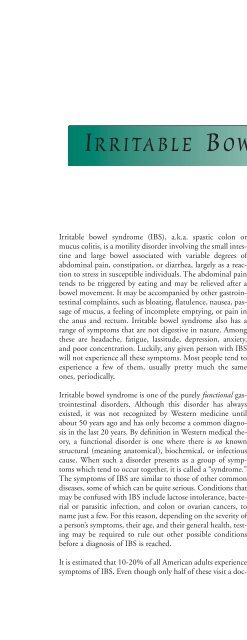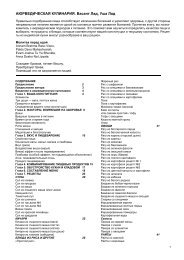- Page 4:
PRAISE FORTHE TREATMENT OF MODERN W
- Page 8:
This volume will serve not only as
- Page 12:
THE TREATMENT OFMODERN WESTERN MEDI
- Page 18:
Published by:BLUE POPPY PRESSA Divi
- Page 22:
xTHE TREATMENT OF MODERN WESTERN DI
- Page 28:
TABLE OF CONTENTS(ALPHABETICAL)Pref
- Page 32:
TABLE OF CONTENTS (ALPHABETICAL)xv5
- Page 36:
TABLE OF CONTENTS(BY MEDICAL SPECIA
- Page 40:
TABLE OF CONTENTS (BY MEDICAL SPECI
- Page 44:
INTRODUCTIONThis book is a clinical
- Page 48:
INTRODUCTION 3appearances from the
- Page 52:
INTRODUCTION 5or even international
- Page 56:
INTRODUCTION 7SAMPLECopyright © Bl
- Page 60:
INTRODUCTION 9Expel windCourse wind
- Page 64:
INTRODUCTION 11the first thing to d
- Page 68:
INTRODUCTION 13understands, the eas
- Page 72:
➤➤➤INTRODUCTION 15if qi stagn
- Page 76:
INTRODUCTION 17may damage yin fluid
- Page 80:
INTRODUCTION 19The lifegate is the
- Page 84:
INTRODUCTION 21tioned above, Qing d
- Page 88:
INTRODUCTION 23formula from the qi-
- Page 92:
INTRODUCTION 25towards yin vacuity
- Page 96:
INTRODUCTION 27HEART-GALLBLADDER QI
- Page 100:
INTRODUCTION 29ment and transformat
- Page 104:
INTRODUCTION 31mai is connected wit
- Page 108:
INTRODUCTION 33scribed].” 31 In o
- Page 112:
INTRODUCTION 35and acute diseases a
- Page 116:
INTRODUCTION 37Similarly, the durat
- Page 120:
1ACNE VULGARISAcne vulgaris or comm
- Page 124:
ACNE VULGARIS 41Scutellariae ), Chi
- Page 128:
ACNE VULGARIS 43Dang Shen (Radix Co
- Page 132:
ACNE VULGARIS 45(Fructus Forsythiae
- Page 136:
2ALLERGIC RHINITISAllergic rhinitis
- Page 140:
ALLERGIC RHINITIS 49Chang Pu (Rhizo
- Page 144:
ALLERGIC RHINITIS 51ANALYSIS OF FOR
- Page 150:
54 THE TREATMENT OF MODERN WESTERN
- Page 154:
56 THE TREATMENT OF MODERN WESTERN
- Page 158:
58 THE TREATMENT OF MODERN WESTERN
- Page 162:
60 THE TREATMENT OF MODERN WESTERN
- Page 166:
62 THE TREATMENT OF MODERN WESTERN
- Page 170:
64 THE TREATMENT OF MODERN WESTERN
- Page 176:
5ANKYLOSING SPONDYLITIS(AS)Ankylosi
- Page 180:
ANKYLOSING SPONDYLITIS (AS) 69Bai S
- Page 184:
ANKYLOSING SPONDYLITIS (AS) 71ANALY
- Page 190:
74 THE TREATMENT OF MODERN WESTERN
- Page 194:
76 THE TREATMENT OF MODERN WESTERN
- Page 198:
78 THE TREATMENT OF MODERN WESTERN
- Page 202:
80 THE TREATMENT OF MODERN WESTERN
- Page 206:
82 THE TREATMENT OF MODERN WESTERN
- Page 210:
84 THE TREATMENT OF MODERN WESTERN
- Page 216:
8BENIGN PROSTATICHYPERTROPHYAlso ca
- Page 220:
BENIGN PROSTATIC HYPERTROPHY (BPH)
- Page 224:
BENIGN PROSTATIC HYPERTROPHY (BPH)
- Page 228:
BENIGN PROSTATIC HYPERTROPHY (BPH)
- Page 232:
9BRONCHIAL ASTHMABronchial asthma i
- Page 236:
BRONCHIAL ASTHMA 97Carmichaeli ), 1
- Page 240:
BRONCHIAL ASTHMA 99lungs. Neverthel
- Page 244:
BRONCHIAL ASTHMA 101For enduring de
- Page 248:
BRONCHIAL ASTHMA 103RX: Liu Jun Zi
- Page 252:
BRONCHIAL ASTHMA 105mixed with deep
- Page 256:
10CARPAL TUNNEL SYNDROMECarpal tunn
- Page 260:
CARPAL TUNNEL SYNDROME (CTS) 109ANA
- Page 264:
11CELIAC DISEASECeliac disease, als
- Page 268:
CELIAC DISEASE 113Ge Gen (Radix Pue
- Page 274:
116 THE TREATMENT OF MODERN WESTERN
- Page 278:
118 THE TREATMENT OF MODERN WESTERN
- Page 284:
13CERVICAL SPONDYLOSISCervical spon
- Page 288:
CERVICAL SPONDYLOSIS 123(Rhizoma Li
- Page 292:
CERVICAL SPONDYLOSIS 125ANALYSIS OF
- Page 296:
CERVICAL SPONDYLOSIS 127(Rhizoma Ch
- Page 302:
130 THE TREATMENT OF MODERN WESTERN
- Page 306:
132 THE TREATMENT OF MODERN WESTERN
- Page 310:
134 THE TREATMENT OF MODERN WESTERN
- Page 316:
15CHRONIC ACTIVE HEPATITISChronic a
- Page 320:
CHRONIC ACTIVE HEPATITIS (CAH) 139A
- Page 324:
CHRONIC ACTIVE HEPATITIS (CAH) 1415
- Page 328:
CHRONIC ACTIVE HEPATITIS (CAH) 143T
- Page 332:
CHRONIC ACTIVE HEPATITIS (CAH) 145A
- Page 336:
16CHRONIC FATIGUE IMMUNEDEFICIENCY
- Page 340:
CHRONIC FATIGUE IMMUNE DEFICIENCY S
- Page 344:
CHRONIC FATIGUE IMMUNE DEFICIENCY S
- Page 348:
17CHRONICGLOMERULONEPHRITISChronic
- Page 352:
CHRONIC GLOMERULONEPHRITIS 155ADDIT
- Page 356:
CHRONIC GLOMERULONEPHRITIS 157Yin J
- Page 360:
CHRONIC GLOMERULONEPHRITIS 159and F
- Page 364:
CHRONIC GLOMERULONEPHRITIS 161add W
- Page 368:
18CHRONIC PANCREATITISChronic pancr
- Page 372:
CHRONIC PANCREATITIS 165TREATMENT P
- Page 376:
CHRONIC PANCREATITIS 167limbs, subt
- Page 380:
19CHRONIC PROSTATITISChronic prosta
- Page 384:
CHRONIC PROSTATITIS 1712. QI STAGNA
- Page 388:
CHRONIC PROSTATITIS 173Tu Fu Ling (
- Page 392:
CHRONIC PROSTATITIS 1752. Although
- Page 396:
20CHRONIC RENAL FAILUREAlso called
- Page 400:
CHRONIC RENAL FAILURE (CRF) 179gram
- Page 404:
CHRONIC RENAL FAILURE (CRF) 181ACUP
- Page 408:
CHRONIC RENAL FAILURE (CRF) 183(Rhi
- Page 412:
21CHRONIC SINUSITISSinusitis is an
- Page 416:
CHRONIC SINUSITIS 187branes, severe
- Page 420:
CHRONIC SINUSITIS 189mix-fried Gan
- Page 424:
CHRONIC SINUSITIS 191each, Jie Geng
- Page 430:
194 THE TREATMENT OF MODERN WESTERN
- Page 434:
196 THE TREATMENT OF MODERN WESTERN
- Page 438:
198 THE TREATMENT OF MODERN WESTERN
- Page 442:
200 THE TREATMENT OF MODERN WESTERN
- Page 446:
202 THE TREATMENT OF MODERN WESTERN
- Page 452:
23COSTOCHONDRITISAlso called Tietze
- Page 456:
COSTOCHONDRITIS 207ENDNOTE:1Yang Ch
- Page 462:
210 THE TREATMENT OF MODERN WESTERN
- Page 468:
25CUSHING’S SYNDROMECushing’s s
- Page 472:
CUSHING’S SYNDROME 215each of Sua
- Page 476:
CUSHING’S SYNDROME 217sity, edema
- Page 480:
26DENGUE FEVERDengue fever, also ca
- Page 484:
DENGUE FEVER 221Hou Po (Cortex Magn
- Page 488:
DENGUE FEVER 223ish the blood and e
- Page 494:
226 THE TREATMENT OF MODERN WESTERN
- Page 498:
228 THE TREATMENT OF MODERN WESTERN
- Page 502:
230 THE TREATMENT OF MODERN WESTERN
- Page 506:
232 THE TREATMENT OF MODERN WESTERN
- Page 510:
234 THE TREATMENT OF MODERN WESTERN
- Page 514:
236 THE TREATMENT OF MODERN WESTERN
- Page 518:
238 THE TREATMENT OF MODERN WESTERN
- Page 524:
30FIBROMYALGIA SYNDROME(FMS)Fibromy
- Page 528:
FIBROMYALGIA SYNDROME (FMS) 243enge
- Page 532:
FIBROMYALGIA SYNDROME (FMS) 245TREA
- Page 536:
FIBROMYALGIA SYNDROME (FMS) 247ACUP
- Page 540:
FIBROMYALGIA SYNDROME (FMS) 2495. S
- Page 544:
FIBROMYALGIA SYNDROME (FMS) 251and
- Page 550:
254 THE TREATMENT OF MODERN WESTERN
- Page 554:
256 THE TREATMENT OF MODERN WESTERN
- Page 558:
258 THE TREATMENT OF MODERN WESTERN
- Page 564:
32HASHIMOTO’S THYROIDITISHashimot
- Page 568:
HASHIMOTO’S THYROIDITIS 263Rou Gu
- Page 572:
HASHIMOTO’S THYROIDITIS 265ANALYS
- Page 578:
268 THE TREATMENT OF MODERN WESTERN
- Page 582:
270 THE TREATMENT OF MODERN WESTERN
- Page 588:
34HERPES GENITALIAHerpes genitalia
- Page 592:
HERPES GENITALIA 275NOTE: This patt
- Page 596:
HERPES GENITALIA 277Ku Shen (Radix
- Page 600:
35HERPES ZOSTERHerpes zoster refers
- Page 604:
HERPES ZOSTER 281and Yi Mu Cao toge
- Page 608:
36HYPERLIPOPROTEINEMIAHyperlipoprot
- Page 612:
HYPERLIPOPROTEINEMIA 285vexatious h
- Page 616:
HYPERLIPOPROTEINEMIA 287govern the
- Page 620:
HYPERLIPOPROTEINEMIA 289Qi (Radix A
- Page 624:
37HYPERTENSIONHypertension refers t
- Page 628:
HYPERTENSION 293this disorder. Yin
- Page 632:
HYPERTENSION 295numbness of the lim
- Page 636:
HYPERTENSION 297RX: Xue Fu Zhu Yu T
- Page 640:
HYPERTENSION 299INGREDIENTS:Gui Ban
- Page 644:
38HYPERTHYROIDISMHyperthyroidism is
- Page 648:
HYPERTHYROIDISM 303tability, easy a
- Page 652:
HYPERTHYROIDISM 305ANALYSIS OF FORM
- Page 656: 39HYPOGLYCEMIAHypoglycemia refers t
- Page 660: HYPOGLYCEMIA 3092. QI VACUITY & PHL
- Page 664: HYPOGLYCEMIA 311and relaxation as w
- Page 670: 314 THE TREATMENT OF MODERN WESTERN
- Page 674: 316 THE TREATMENT OF MODERN WESTERN
- Page 680: 41IDIOPATHIC THROMBOCYTOPENICPURPUR
- Page 684: IDIOPATHIC THROMBOCYTOPENIC PURPURA
- Page 688: IDIOPATHIC THROMBOCYTOPENIC PURPURA
- Page 692: 42INTERSTITIAL CYSTITISInterstitial
- Page 696: INTERSTITIAL CYSTITIS (IC) 327INGRE
- Page 700: INTERSTITIAL CYSTITIS (IC) 329ACUPU
- Page 704: INTERSTITIAL CYSTITIS (IC) 331regul
- Page 712: IRRITABLE BOWEL SYNDROME (IBS) 335f
- Page 716: 44LATERAL EPICONDYLITISLateral epic
- Page 720: LATERAL EPICONDYLITIS 339ing profes
- Page 726: 342 THE TREATMENT OF MODERN WESTERN
- Page 730: 344 THE TREATMENT OF MODERN WESTERN
- Page 734: 346 THE TREATMENT OF MODERN WESTERN
- Page 740: 46LYME DISEASELyme disease is a tic
- Page 744: LYME DISEASE 351ANALYSIS OF FORMULA
- Page 748: 47MACULAR DEGENERATIONAlso called s
- Page 752: MACULAR DEGENERATION 355(Radix Salv
- Page 756:
MACULAR DEGENERATION 357more succes
- Page 762:
360 THE TREATMENT OF MODERN WESTERN
- Page 766:
362 THE TREATMENT OF MODERN WESTERN
- Page 770:
364 THE TREATMENT OF MODERN WESTERN
- Page 774:
366 THE TREATMENT OF MODERN WESTERN
- Page 778:
368 THE TREATMENT OF MODERN WESTERN
- Page 782:
370 THE TREATMENT OF MODERN WESTERN
- Page 786:
372 THE TREATMENT OF MODERN WESTERN
- Page 790:
374 THE TREATMENT OF MODERN WESTERN
- Page 794:
376 THE TREATMENT OF MODERN WESTERN
- Page 798:
378 THE TREATMENT OF MODERN WESTERN
- Page 804:
51MYASTHENIA GRAVISMyasthenia gravi
- Page 808:
MYASTHENIA GRAVIS 383the sinew vess
- Page 812:
MYASTHENIA GRAVIS 3855. BLOOD STASI
- Page 816:
52ORAL LEUKOPLAKIAOral leukoplakia
- Page 820:
ORAL LEUKOPLAKIA 389ACUPUNCTURE & M
- Page 824:
53OSTEOARTHRITISAlso called degener
- Page 828:
OSTEOARTHRITIS (OA) 393ANALYSIS OF
- Page 832:
OSTEOARTHRITIS (OA) 395INGREDIENTS:
- Page 836:
OSTEOARTHRITIS (OA) 397ADDITIONS &
- Page 840:
OSTEOARTHRITIS (OA) 399Feng (Radix
- Page 846:
402 THE TREATMENT OF MODERN WESTERN
- Page 850:
404 THE TREATMENT OF MODERN WESTERN
- Page 856:
55PARKINSON’S DISEASEParkinson’
- Page 860:
PARKINSON’S DISEASE (PD) 409Hui (
- Page 864:
PARKINSON’S DISEASE (PD) 411Ming
- Page 868:
56PEPTIC ULCERSPeptic ulcers are a
- Page 872:
PEPTIC ULCERS 415also very common t
- Page 876:
PEPTIC ULCERS 4174. CONSTRUCTIVE &
- Page 880:
PEPTIC ULCERS 419RX: Dan Shen Yin (
- Page 884:
57PERIARTHRITISOF THE SHOULDERAlso
- Page 888:
PERIARTHRITIS OF THE SHOULDER 423Ov
- Page 892:
PERIARTHRITIS OF THE SHOULDER 425TR
- Page 896:
PERIARTHRITIS OF THE SHOULDER 427Xu
- Page 902:
430 THE TREATMENT OF MODERN WESTERN
- Page 906:
432 THE TREATMENT OF MODERN WESTERN
- Page 910:
434 THE TREATMENT OF MODERN WESTERN
- Page 914:
436 THE TREATMENT OF MODERN WESTERN
- Page 918:
438 THE TREATMENT OF MODERN WESTERN
- Page 924:
60PIRIFORMIS SYNDROMEPiriformis syn
- Page 928:
PIRIFORMIS SYNDROME 443ACUPUNCTURE
- Page 932:
61PNEUMONIAPneumonia or pneumonitis
- Page 936:
PNEUMONIA 4473. PHLEGM HEAT CONGEST
- Page 940:
62POLYMYOSITIS/DERMATOMYOSITISPolym
- Page 944:
POLYMYOSITIS/DERMATOMYOSITIS 451Hua
- Page 948:
POLYMYOSITIS/DERMATOMYOSITIS 453Fu
- Page 952:
POLYMYOSITIS/DERMATOMYOSITIS 455TRE
- Page 958:
458 THE TREATMENT OF MODERN WESTERN
- Page 962:
460 THE TREATMENT OF MODERN WESTERN
- Page 966:
462 THE TREATMENT OF MODERN WESTERN
- Page 970:
464 THE TREATMENT OF MODERN WESTERN
- Page 976:
65PULMONARY TUBERCULOSISTuberculosi
- Page 980:
PULMONARY TUBERCULOSIS 469NOTE: The
- Page 984:
PULMONARY TUBERCULOSIS 471RX: Pao Z
- Page 988:
66RAYNAUD’S PHENOMENON& DISEASERa
- Page 992:
RAYNAUD’S PHENOMENON & DISEASE 47
- Page 996:
RAYNAUD’S PHENOMENON & DISEASE 47
- Page 1000:
67REFLUX ESOPHAGITISReflux esophagi
- Page 1004:
REFLUX ESOPHAGITIS 481Xiang Fu (Rhi
- Page 1008:
REFLUX ESOPHAGITIS 483REMARKS1. Liv
- Page 1014:
486 THE TREATMENT OF MODERN WESTERN
- Page 1018:
488 THE TREATMENT OF MODERN WESTERN
- Page 1022:
490 THE TREATMENT OF MODERN WESTERN
- Page 1026:
492 THE TREATMENT OF MODERN WESTERN
- Page 1030:
494 THE TREATMENT OF MODERN WESTERN
- Page 1034:
496 THE TREATMENT OF MODERN WESTERN
- Page 1038:
498 THE TREATMENT OF MODERN WESTERN
- Page 1042:
500 THE TREATMENT OF MODERN WESTERN
- Page 1046:
502 THE TREATMENT OF MODERN WESTERN
- Page 1050:
504 THE TREATMENT OF MODERN WESTERN
- Page 1054:
506 THE TREATMENT OF MODERN WESTERN
- Page 1060:
73STRESS INCONTINENCEStress inconti
- Page 1064:
74SUBARACHNOID HEMORRHAGE(SAH)Subar
- Page 1068:
SUBARACHNOID HEMORRHAGE 513point an
- Page 1072:
SUBARACHNOID HEMORRHAGE 5156. Predn
- Page 1078:
518 THE TREATMENT OF MODERN WESTERN
- Page 1082:
520 THE TREATMENT OF MODERN WESTERN
- Page 1086:
522 THE TREATMENT OF MODERN WESTERN
- Page 1090:
524 THE TREATMENT OF MODERN WESTERN
- Page 1094:
526 THE TREATMENT OF MODERN WESTERN
- Page 1100:
76TEMPOROMANDIBULAR JOINTSYNDROMETe
- Page 1104:
TEMPOROMANDIBULAR JOINT SYNDROME (T
- Page 1108:
TEMPOROMANDIBULAR JOINT SYNDROME (T
- Page 1112:
TEMPOROMANDIBULAR JOINT SYNDROME (T
- Page 1116:
TEMPOROMANDIBULAR JOINT SYNDROME (T
- Page 1122:
540 THE TREATMENT OF MODERN WESTERN
- Page 1126:
542 THE TREATMENT OF MODERN WESTERN
- Page 1130:
544 THE TREATMENT OF MODERN WESTERN
- Page 1134:
546 THE TREATMENT OF MODERN WESTERN
- Page 1138:
548 THE TREATMENT OF MODERN WESTERN
- Page 1142:
550 THE TREATMENT OF MODERN WESTERN
- Page 1146:
552 THE TREATMENT OF MODERN WESTERN
- Page 1150:
554 THE TREATMENT OF MODERN WESTERN
- Page 1154:
556 THE TREATMENT OF MODERN WESTERN
- Page 1158:
558 THE TREATMENT OF MODERN WESTERN
- Page 1162:
560 THE TREATMENT OF MODERN WESTERN
- Page 1168:
BIBLIOGRAPHYCHINESE LANGUAGE BIBLIO
- Page 1172:
CHINESE LANGUAGE BIBLIOGRAPHY 565Ne
- Page 1176:
CHINESE LANGUAGE BIBLIOGRAPHY 567
- Page 1180:
ENGLISH LANGUAGE BIBLIOGRAPHY 569Zh
- Page 1184:
ENGLISH LANGUAGE BIBLIOGRAPHY 571En
- Page 1188:
FRENCH LANGUAGE BIBLIOGRAPHY 573FRE
- Page 1194:
576 THE TREATMENT OF MODERN WESTERN
- Page 1198:
578 THE TREATMENT OF MODERN WESTERN
- Page 1202:
580 THE TREATMENT OF MODERN WESTERN
- Page 1206:
582 THE TREATMENT OF MODERN WESTERN
- Page 1210:
584 THE TREATMENT OF MODERN WESTERN
- Page 1214:
586 THE TREATMENT OF MODERN WESTERN
- Page 1218:
588 THE TREATMENT OF MODERN WESTERN
- Page 1222:
590 THE TREATMENT OF MODERN WESTERN
- Page 1226:
592 THE TREATMENT OF MODERN WESTERN
- Page 1230:
594 THE TREATMENT OF MODERN WESTERN
- Page 1234:
596 THE TREATMENT OF MODERN WESTERN
- Page 1238:
CURING DEPRESSION NATURALLY WITHCHI
- Page 1242:
THE SYSTEMATIC CLASSIC OFACUPUNCTUR
















